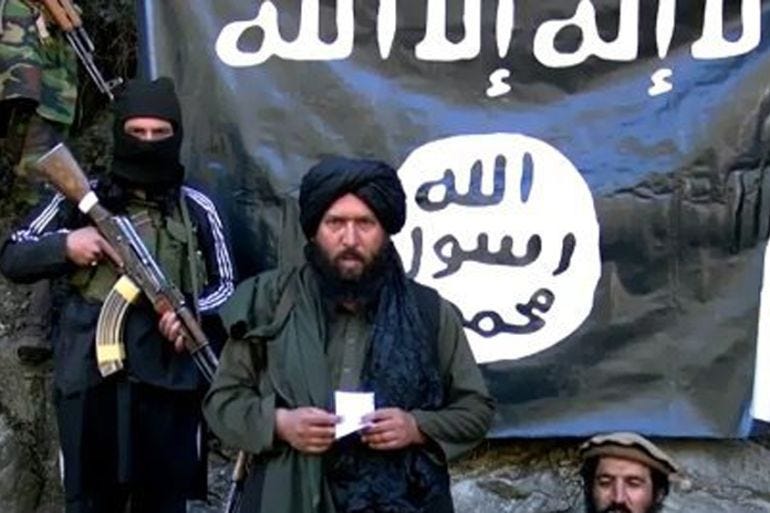Note from Lethal Minds:
Bulletin From The Borderlands is a joint project between Lethal Minds and some of the most talented OSINT analysts and independent journalists working today. Our goal is to provide you with a clear, accurate, and informative view of the world, free from censorship or bias. The Bulletin will bring you the facts, our analysis, and our evidence. We hope you find our work helps you better understand the complicated and increasingly volatile world in which we live.
Be informed, be prepared, be lethal.
The Bulletin Team:
Analyze Educate : Brodie Kirkpatrick (Analyze & Educate) is a Marine Corps infantry veteran. He is a graduate San Jose State University with a Bachelor’s Degree in Political Science. He runs Analyze & Educate, a podcast and associated social media pages discussing geopolitics, armed conflicts, news, and history. In his capacity with Lethal Minds he is the team lead for the Bulletin From the Borderlands, Americas Desk chief, and an editor.
The Expeditionary Intelligence Group : The Expeditionary Intelligence Group Instagram page is a project delivering flash news utilizing open-source intelligence combined with human asset contributions and geographic intelligence to provide the general public with objective bias-free global news that tells the whole story based on the facts and on-the-ground insights they feel are missing from a lot of mainstream news reporting.
The Defense Bulletin: Defense Bulletin is run by John M Larrier. As a civilian, I’ve closely followed strategic developments for close to a decade, but “launched” the Bulletin during the pullout in Afghanistan due to the extreme nature of the misinformation I saw my peers as well as others reading into. The lacuna that the general populace has about these now very prevalent subjects is the stated goal for Defense Bulletin
Robert “Bobby” Acuña is a graduate of Texas A&M University – Corpus Christi with both a BBA in Economics and a BA in Political Science. He was originally born in Subic Bay, Philippines but lived much of his life in Corpus Christi, Texas. He currently resides in Houston, Texas. Growing up in a military family, Robert developed a passion for politics as well as studying war history. Some of his earliest memories were watching World War II documentaries with his grandfather. This led him to his educational path in university. One of his favorite aspects of his collegiate career was political research. His most recent work was with The Modern Insurgent. He believes Bulletin On The Borderlands will help to fulfill that urge to understand and stay consistently aware of the geopolitical issues around the world. Outside of his interest in global affairs, Robert is an avid Brazilian Jiu Jitsu practitioner and rugby player.
ALCON S2: A veteran of the New Zealand military intelligence community, if it walks, talks, or crawls in Asia, ALCON S2 knows about it. Cole is the preeminent source of OSINT for the Oceania and South East Asia region.
Jillian Butler: A lifelong writer and San Diego native. She received her bachelor’s degree in English and History at the University of Ulster in Northern Ireland. Upon moving back to San Diego, she received her master’s in International Relations at the University of San Diego where she centered her research around jihadi terror. She is also a contributing writer for Pop Smoke Media, American Grit, The Modern Insurgent, and Lethal Minds Journal’s Bulletin from the Borderlands. In her free time, she can be found surfing, training jiu jitsu, or improving her craft of cooking the perfect ribeye.
Sponsors
The Bulletin is brought you to by PB Abbate.
As you likely know, Lethal Minds Journal shares common ancestry with Patrol Base Abbate, one of the most impactful veteran’s outreach organizations in America. One of the ways in which we connect is through a love of the written word, a belief in the power of good writing to help give a voice to people who need to be heard, and a desire to help service members and vets connect through self-expression.
In This Issue:
The Americas: Covered in this issue by Brodie Kirkpatrick (Analyze & Educate) and Robert “Bobby” Acuña.
After multiple delays, Kenyan police officers have arrived in Haiti to lead a multinational peacekeeping mission. The officers will patrol the streets of Port-au-Prince to deter violent gangs that control 80% of the city. In the United States, a group of Islamic State affiliated migrants were arrested in several cities. This highlights the security issue that the country faces along the southern border.
Europe: Covered in this issue by Brodie Kirkpatrick (Analyze & Educate) and Edwin Dudley-Taylor.
Tensions continue to rise across the continent. In the South Caucasus, Armenia is moving away from Russia’s sphere of influence for the first time in a century. Recent wars with Azerbaijan have left Armenia wondering if Russia is willing, or capable, or fulfilling its duties as a CSTO member-state. On NATO’s eastern flank, Poland is fortifying its border with Belarus as the latter wields migrants as a weapon against the former.
East Asia and Oceania: Covered in this issue by John M. Larrier (Defense Bulletin).
The South China Sea has seen a notable rise in tensions in the past 2 years, with said tensions significantly increasing in recent months. As China continues to increase its coercive measures in the local region, the U.S. response, or lack thereof, has raised serious doubts about the future of the U.S. commitments in the region.
Central Asia and the Middle East: Covered in this issue by Eric Sheppler.
An Israeli military incursion against Hezbollah in southern Lebanon seems increasingly likely. Though the scale and scope of such an action are as of yet unknown, any offensive across the border by the IDF has the potential to widen the conflict. Iran is, in all likelihood, feeling increasing pressure, both from internal factions and from its militant proxies, to take a more active role in the Palestinian conflict or even confront Israel directly. Hezbollah is Iran’s most important proxy force, and the threat of its destruction or significant degradation would, in all probability, force Tehran to act openly and directly –something it has hesitated to do for the most part thus far.
Africa: Covered in this issue by Expeditionary Intelligence and Jillian Butler.
Over the past two weeks, Africa has been experiencing spikes in violence and insecurity due to many factors, most of which have been compounding over recent months. In Kenya, Violent protests erupted over new proposed tax increases that have been met with resistance from Kenyan citizens since its inception. In Niger, we have begun to witness attacks being coordinated by separatist groups that don’t agree with the new military Junta or their aligned interests with China and Russia.
The Highlight: Israel Plans to Invade Lebanon
The Americas
Brodie Kirkpatrick, Robert “Bobby” Acuña
Boots on the Ground In Haiti
After nearly two years of debate, delays, and false starts, it seems that the Kenyan-led Multinational Security Support Mission will soon begin. Last week, the first contingent of Kenyan police officers arrived in Port-au-Prince, Haiti and are expected to soon deploy onto the streets of the capital city.
Delays
After Haiti’s former Prime Minister Ariel Henry pleaded with the international community to deploy a peacekeeping force to his county, Kenya offered to lead such a mission in July 2023. Despite the willingness of Kenyan President William Ruto to sign on to the deployment, it wasn’t until October 2023 that the UN Security Council approved the formation of the Multinational Security Support Mission for Haiti.
The deployment of 1,000 Kenyan police officers to Haiti was held up for months after the Security Council resolution. Issues regarding funding of the MSS were a problem to be overcome. The United States has provided the bulk of funding for the mission, over $300 million. Additionally, legal issues inside Kenya also caused delays. Kenya’s high court blocked the deployment until a mutual agreement was signed with Haiti.
The signing of this agreement by PM Henry in Kenya’s capital Nairobi inadvertently led to another major cause for delay. A coalition of Haitian gangs took advantage of Henry’s absence and began an offensive to oust him from power. Within days, the offensive was successful in forcing Henry to resign while stranded in Puerto Rico. In the absence of any semi-legitimate governing executive in Haiti, President Ruto put the deployment of his police officers on hold. That hurdle was not cleared until the incumbent Presidential Transitional Council was sworn in weeks later.
First Arrival
On Tuesday, the first group of around 200 Kenyan officers arrived at Port-au-Prince’s international airport. Those officers were individually vetted by the U.S. State Department. Most of the contingent comes from various elite Kenyan law enforcement units, including those that have fought Somali al-Qaeda affiliate al-Shabaab.
The United States applauded the arrival, with State Department spokesman Matthew Miller saying that it was “just the first of several milestones in the process to restore security and prosperity in Haiti”. In addition to providing the vast majority of the MSS’ current funding, the United States has also announced its plans to designate Kenya as a major non-NATO ally. This would make it the first country in sub-Saharan Africa to receive such a designation.
Expectations
The Kenyan officers do not have an easy task. They must assist the Haitian National Police (HNP) in bringing order to the country. Their main focus will be Port-au-Prince, of which at least 80% is controlled by a multitude of gangs. According to Kenyan Deputy Police Inspector General Noor Gabow, these officers have been outfitted appropriately for their mission. They have brought their service weapons from Kenya, as well as body armor, helmets, and individual first aid kits (IFAKs). Prominent Haitian gang leader Jimmy “Barbeque” Cherizier has already sworn to fight foreign troops on Haitian soil.
The MSS will have to hit the ground running. According to the authorization from the UN Security Council, the force is initially only allowed to deploy to Haiti for a year, with a review being conducted after nine months. In addition to Kenya, six other nations are expected to provide troops, including Jamaica, Benin, and Bangladesh. The MSS force is expected to reach 2,500 personnel at full strength. The force will be working in close cooperation with the HNP, which has a new leader. Newly selected Prime Minister Garry Conille recently fired HNP chief Frantz Elbe and replaced him with Rameau Normil, who has previously served in the post. The MSS will have legal cover as well. Thanks to a new Status of Force agreement signed between Haiti and the Organization of American States (OAS), MSS troops will have immunity from prosecution in Haiti for any crimes committed. Personnel will face the jurisdiction of their home country if Haitian authorities determine that they have committed a crime.
Global Islamic Extremism

The international attention on the Israel-Hamas conflict has created an atmosphere that detracted global attention from the other various conflicts and insurgent groups originating in the Middle East and Central Asia. Intelligence sources have uncovered a power struggle between factors of Al Qaeda, ISIS, Taliban, and the Islamic Republic of Iran. Many of these groups are vying for the title of leader of what they believe is the true interpretation of Islamic Law. The Israel-Hamas conflict has also diverted most of the public attention which has allowed some of these various factions to operate under the radar. Some intelligence sources believe this has allowed some factions to collaborate, create alliances, and grow in their own spheres of influence. This has increased the heightened fear of upcoming terrorist attacks on western countries.
Islamic State and Its Influence
The Islamic State of Syria and Iraq or ISIS has been pushed to an almost dormant state within the geography of where the caliphate controlled. Much of the land that ISIS held in Syria and Iraq has been taken back. In Syria, a coalition of Bashar Assad’s forces with help from the Wagner Group from Russia have regained control. In Iraq, a mix of Iraqi government military, Kurdish militias, and Shia militias who were armed and trained by Iran have taken back territory that was occupied by ISIS. The goal of ISIS was to establish a global Islamic caliphate, this prompted them to recruit other Islamic jihadist groups around the globe during their inception. After the fall of the Iraqi and Syrian caliphate of IS, globally we saw a decline in their influence in many of their claimed regions. Pockets of IS within Africa and Central Asia have seen a resurgence in their influence. Three groups with particularly strong influence are the IS factions based in the Khorasan region, African Sahel region, and Northern Africa. Currently the most notable of the three, IS–Khorasan Province or ISKP have been garnering global attention by conducting activity outside their region.
Recent Terror Attacks in Russia
The most recent major attack conducted by ISKP was in Moscow, Russia on March 22. The Crocus City Hall, a concert venue, was attacked by four Tajik insurgents armed with automatic weapons who were affiliated with and trained by the group. The result of the attack was 137 dead and nearly 140 people injured. The building was also set on fire further complicating the kill or capture of the insurgents as well as rescue of civilians. U.S. intelligence warned Russia of a possible terrorist attack, which was ignored. On June 23, Russia faced another terrorist attack in Derbent and the capital of Dagestan, Makhachkala. A synagogue and Orthodox church were set ablaze. 15 law enforcement officers and four civilians were killed in the attack. One of the deceased was an Orthodox priest, who reportedly had his throat slit before the church was set on fire. ISKP did not coordinate the attacks in Dagestan but did praise the terrorist group, Islamic Emirate of the Caucasus for executing the attacks.
ISKP Affiliates in the U.S.
U.S. intelligence has announced that they have uncovered a possible plot from ISKP to conduct an attack on U.S. soil. On June 11, 2024, eight Tajik nationals with ties to ISKP were arrested in New York, Philadelphia, and Los Angeles. Authorities claim that each of the eight individuals entered the U.S. through the southern border. Each of the men lacked proper identification and were released by Homeland Security into the U.S. and were given notices to appear in immigration court. Two of the men had entered the U.S. around spring 2023. At least one out of the eight men had used the CBP One app created by the Biden administration to enter the U.S.. The CBP One is a free app that allows noncitizens who make their way to U.S. ports of entry can access asylum. Homeland Security began to scrutinize the identities of these men as they had uncovered a Turkish smuggling ring which trafficked known IS affiliates into the U.S.. So far authorities deny that the individuals were part of any imminent terror plot. Although, with all the activity with IS in Russia, it leads you to question this statement.
Security on the Southern Border
This is not the first time Islamic extremists have taken advantage of the immigration crisis we see on the southern border. On March 9, reports of a Hezbollah associate, Basel Basel Ebbadi was detained on the southern border at El Paso, Texas. Ebbadi stated that he was sent by Hezbollah to orchestrate a terrorist attack in New York. Ebbadi later recanted that statement stating he was escaping Hezbollah and sought to get asylum. In April of this year, Mohammed Karwin, who is on the national terror watchlist, was detained in San Antonio, Texas. The judge released Karwin on bond as he deemed him “not a threat”. His movement in the U.S. is not restricted, he was only instructed to appear before an immigration hearing sometime this year. Karwin came into the U.S. in March 2023 through the southern border in Tijuana, Mexico. In 2023, Homeland Security reported that they had detained 172 individuals that were on the national terror watchlist. That is an increase of over 100 encounters from 2023.
Potential Terror Threats
The migrant crisis has seen a drastic rise in undocumented individuals coming across the southern border. Many of these individuals lack proper documentation to properly determine whether or not a threat to national security. Within the 2023 fiscal year, the Department of Homeland Security estimates that we underwent the highest number of individual migrant encounters at the southern border at 3,201,144 individuals. The Department of Homeland Security stated in 2021, that they had estimated that 1,956,519 had crossed. In 2022, the Department of Homeland Security stated that they had estimated that 2,766,582 individuals had crossed. We can only assume that the 2024 estimates when released would be higher than 2023. On June 16, 2024, U.S. House Intelligence Committee Chairman, Mike Turner announced that “We are at the highest level of a possible terrorist threat”. This was after former CIA director, Mike Morell announced that we are seeing warning signs like what we saw leading up to the 9/11 terror attack. It is unclear how the Biden administration plans to strengthen security on the border as well as enhance vigilance for individuals on the national terrorism watchlist. One can only wonder how close we are to a major terrorist attack on U.S. soil. It also makes one wonder how many potential terrorist attacks that intelligence has unveiled and stopped.
Looking Forward
Haiti’s prominent gangs have already threatened to go to war with any foreign forces that step into the country. Their willingness to carry out that threat remains to be seen.
On the southern border, security concerns are likely to remain a major issue. Recent executive orders issued regarding immigration and the crisis on the U.S.-Mexico border will likely have little effect on the situation on the ground considering the loopholes and exceptions that are embedded in the orders. For that reason, the threat of malign actors entering the country through the southern border will remain.
Keep reading with a 7-day free trial
Subscribe to Lethal Minds to keep reading this post and get 7 days of free access to the full post archives.






